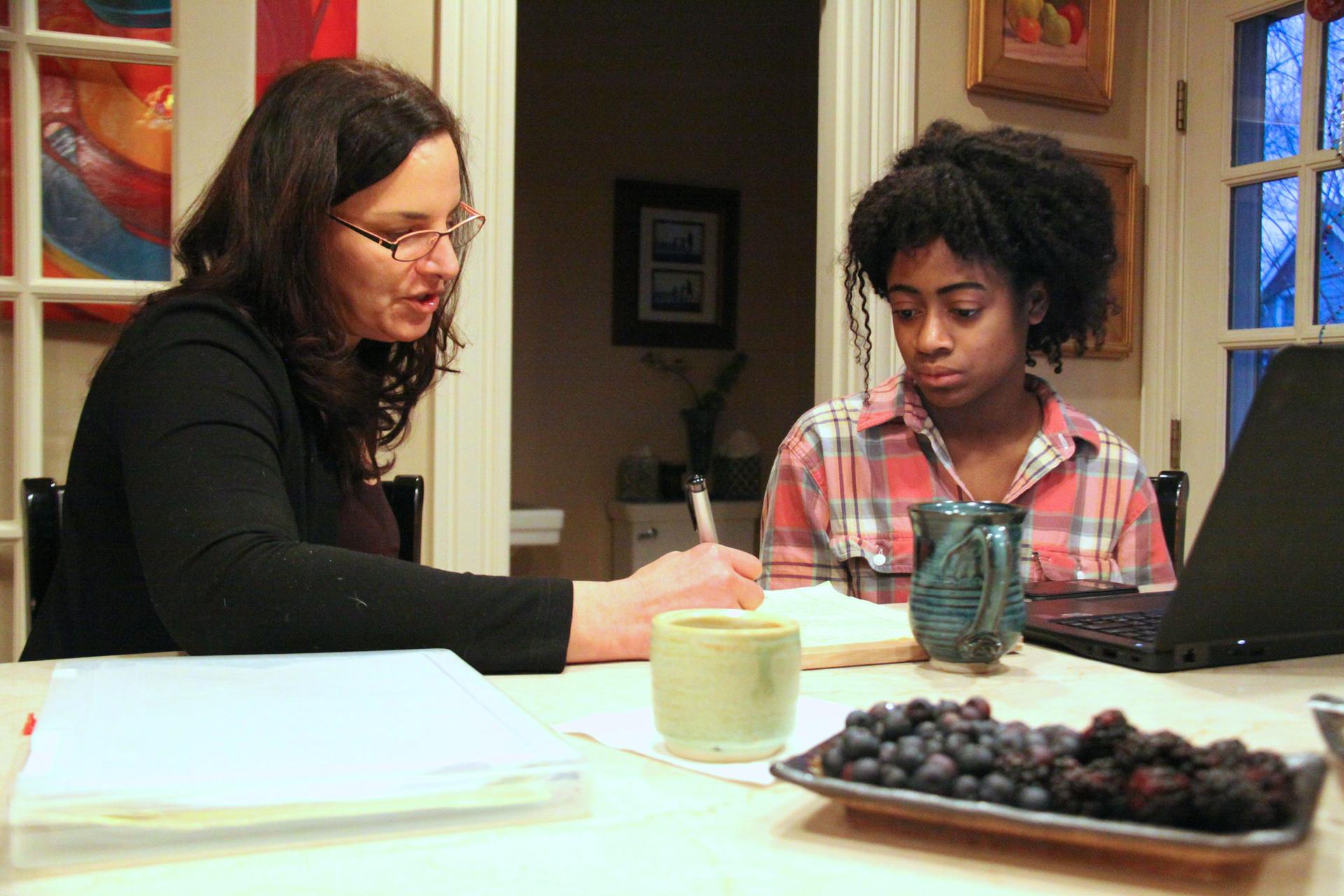High school senior Mirabelle Espady and her mentor Marsha Kessler sit around the kitchen counter at Kessler’s home, reviewing Mirabelle’s college application.
When 17-year-old Mirabelle Espady first decided to apply to college, she turned to Google.
“I was scoping the Internet and just figuring out tips and tricks on your application to college,” Mirabelle says.
Mirabelle is a senior at Newton North High School in Newton, Massachusetts, where most of her classmates can turn to their own college-educated parents for help.
Mirabelle can’t. Her parents never went to college, and English is not their first language.
"It’s not that I wasn't getting help," she says. "It's more like they didn't know how to help with application processes in the United States."
Mirabelle has a guidance counselor at school, but says it’s not enough — she needs help navigating her college essays, meeting deadlines and filling out financial aid forms.
Through a new program called Transitioning Together, she's now putting the final touches on her college application with the help of volunteer-mentor Marsha Kessler.
During one-on-one sessions, the two sit shoulder-to-shoulder at Kessler’s kitchen counter, going over a list of schools, reviewing financial aid forms and tweaking the language in Mirabelle’s college essay. Unlike traditional college coaching and tutoring, this program is very informal.
“Mirabelle and I text back and forth and we’ll email and stuff, but I know people who are involved in this who are mentors who are telling me, ‘I’m texting my mentee every day,’” says Kessler, turning to Mirabelle to add, “You’re lucky that I don't do that.”
Kessler has plenty of experience with college admissions mania. She and her husband went through the process twice with their own two daughters and learned a lot.
“Seeing how much there is to navigate, I feel like it's a really unfair disadvantage that some kids don't have more support," says Kessler. "It's not a level playing field otherwise."
To level the playing field, in 2012 Newton North began harnessing the knowledge of parents like Kessler, who had seen their own kids off to college — recruiting them to help first generation kids like Mirabelle.
"In order to provide equal opportunity for students who are first in their family to go to college, we need to give them more," says former Newton North Principal Jen Price, one of the key players behind the creation of Transitioning Together.
More: Immigrant student life in the US
Price launched the program after noticing significant economic and social inequity in Newton, including a five percent college enrollment gap between white and black graduates, and a nearly 10 percent gap between students from low-income and middle-class or upper-class families.
"We looked at data, we thought about it and I just said, 'You know what? This is an amazing community. There are all these parents who have basically helped — if not done the process for their kids to get into college. We have so many resources in Newton. We don't need to hire anyone. We just need to match these people with these kids,'" says Price.
Now in its third year, the program is thriving.
"As people had amazing experiences, they started talking at cocktail parties and to their friends and to their neighbors and so the mentor pool has really grown,” says Price.
Price says the vast majority of mentors keep in touch with students after they graduate from high school, helping them set up their dorm rooms and reminding them to fill out financial aid forms. That communication helps students not just get into school, but also stay in school.
"The mentors develop relationships with these kids, so they just don't let go," says Price.
Price is now superintendent of Andover Public Schools, but on her bookshelf she keeps a framed graduation cap — a gift from Patricia Mumba, now a sophomore at Cornell University and one of the first Newton North students to go through the program.
"Something I always told her was that, 'To those whom much has been given, much has been expected.' And as you can see, she bedazzled her mortarboard with that saying,” says Price. “I just think it's a wonderful example of how this program can change lives."
And the number of the lives impacted is growing.
Last year, 29 students participated, and all 29 are now enrolled in college. This year, 40 students are taking part, and, with the help of volunteer mentors, getting ready to hit the 'Send' button on their college applications.
This story was produced by On Campus, a public radio reporting initiative focused on higher education produced in Boston at WGBH.
Share your thoughts and ideas on Facebook at our Global Nation Exchange, on Twitter @globalnation, or contact us here.
